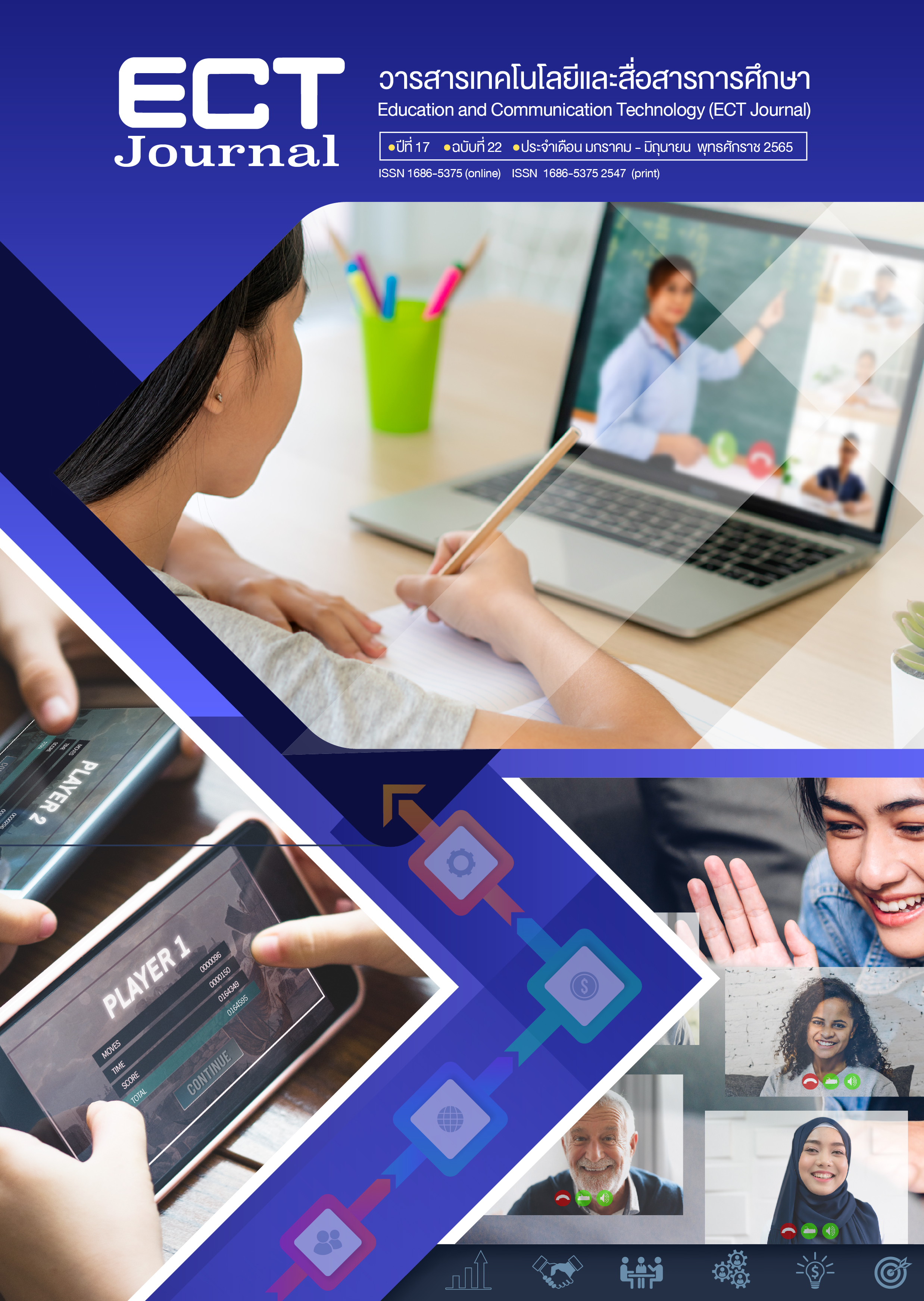The Development of Learning by Using Gamification withTask-Based Learning to Enhance English Reading Comprehension and Learning Motivation of Matthayomsuksa 3 Students
Keywords:
gamification, task-based learning, English reading comprehension, learning motivationAbstract
The purposes of this research and development were to 1)study the fundamental and needs for the development of learning by using gamification and task-based learning; 2) develop efficiency of lesson plans to the efficiency criterion 75/75 and; 3) evaluate learning which had sub-objectives as follows: 3.1) compare students’ English reading comprehension before and after learning 3.2) study students’ English reading comprehension after learning with 70% criteria 3.3) compare students’ learning motivation before and after learning and 3.4) evaluate students’ satisfaction. The sample comprises of 39 mattayomsuksa 3/8 at Hua-Hin school. The cluster random sampling with classroom unit was employed for selecting. The research instruments were 1) lesson plans on gamification and task-based learning 2) the pre-test and post-test for English reading comprehension 3) the learning motivation checklist and 4) the questionnaire of students’ satisfaction. The data were analyzed by percentage (%), mean (M), standard deviation (SD), t-test dependent, one sample t-test and content analysis. The research results were:
1) Teachers and students have realized the significance of game mechanics and tasks that can motivate and provide students to participate in language practice
2) Lesson plan sexhibited a criterion efficiency of 75/75 (76.92/75.73)
3) The results of evaluation learning were as follow: 3.1) The students’ English reading comprehension after studying were significantly higher than before at the .05 level 3.2) The students’ English reading comprehension after studying were 75.73 which higher than the criterion of 70 percent that were statistically significant higherat .05 level
3.3) The students’ learning motivation after studying were significantly higher than before at the .05 level and 3.4) The students’ satisfaction toward learning by using gamification and task-based learning were at the highest level
References
กิ่งกมล ศิริประเสริฐ. (2563). การสอนภาษาอังกฤษเพื่อการสื่อสารตามแนวคิดเกมมิฟิเคชั่น (Gamification) กับรูปแบบการเรียนออนไลน์ [วิทยานิพนธ์ปริญญามหาบัณฑิต ไม่ได้ตีพิมพ์]. มหาวิทยาลัยนเรศวร.
กิตติ ประเสริฐสุข. (2555). ASEAN Insight: ทักษะภาษาอังกฤษกับอาเซียน. กรุงเทพธุรกิจ.
ชัยยงค์ พรหมวงศ์. (2556). การทดสอบประสิทธิภาพสื่อหรือชุดการสอน. วารสารศิลปากรศึกษาศาสตร์วิจัย, 5(1), 7-20. https://so05.tci-thaijo.org/index.php/suedureasearchjournal/article/view/28419
ณัฐพงศ์ มีใจธรรม. (2563). การพัฒนาผลสัมฤทธิ์ทางการเรียนภาษาอังกฤษโดยใช้เทคนิคเกมมิฟิเคชัน (GAMIFICATION) สำหรับนักเรียนชั้นประถมศึกษาปีที่ 5. วารสารศึกษาศาสตร์ มหาวิทยาลัยบูรพา, 32(2), 76-90. https://so02.tci-thaijo.org/index.php/edubuu/article/view/251324
ประภาวรรณ ตระกูลเกษมสุข. (2559). การประยุกต์ใช้รูปแบบการเล่นวิดีโอเกมในการเรียนการสอนที่มีต่อการพัฒนาพฤติกรรม การเข้าชั้นเรียน การมีส่วนร่วม และผลสัมฤทธิ์ทางการเรียนของนักศึกษาระดับปริญญาตรี. ใน การประชุมหาดใหญ่วิชาการระดับชาติและนานาชาติครั้งที่ 7 (น. 180-182). มหาวิทยาลัยหาดใหญ่.
พรนภัส ทับทิมอ่อน. (2562). การพัฒนารูปแบบการสอนอ่านภาษาอังกฤษแบบเน้นภาระงานร่วมกับบทเรียนออนไลน์เพื่อพัฒนาความสามารถในการอ่านภาษาอังกฤษเพื่อความเข้าใจและการอ่านเชิงวิเคราะห์สำหรับนักศึกษาปริญญาตรี [วิทยานิพนธ์ปริญญาดุษฎีบัณฑิต ไม่ได้ตีพิมพ์]. มหาวิทยาลัยศิลปากร.
พิศมัย กิ่งสกุล. (2560). การพัฒนากิจกรรมการเรียนรู้แบบเน้นงานปฏิบัติเพื่อส่งเสริมความสามารถด้านการพูดภาษาอังกฤษ สำหรับนักเรียนชั้นมัธยมศึกษาปีที่ 3 [วิทยานิพนธ์ปริญญามหาบัณฑิต ไม่ได้ตีพิมพ์]. มหาวิทยาลัยนเรศวร.
เพ็ญนภา ทัพพันธุ์. (2561). การพัฒนาแบบฝึกเสริมทักษะการอ่านภาษาอังกฤษเพื่อความเข้าใจโดยใช้กิจกรรมการเรียนรู้แบบเน้นภาระงาน สำหรับนักเรียนชั้นประถมศึกษาปีที่ 6. ใน การประชุมนำเสนอผลงานวิจัยระดับบัณฑิตศึกษาครั้งที่ 13 (น. 1816-1827). มหาวิทยาลัยรังสิต.
วรพงษ์ แสงประเสริฐ. (2562). ผลการสอนการอ่านโดยใช้เกมมิฟิเคชันที่มีต่อผลสัมฤทธิ์ในการอ่านภาษาอังกฤษเพื่อความเข้าใจและเจตคติที่มีต่อการสอนอ่านของนักเรียนมัธยมศึกษาตอนปลาย. ใน การประชุมเสนอผลงานวิจัยระดับชาติ มหาวิทยาลัยสุโขทัยธรรมาธิราช ครั้งที่ 10 (น. 85-94). มหาวิทยาลัยสุโขทัยธรรมาธิราช.
วรรณธิดา ยลวิลาศ. (2562). การสร้างแรงจูงใจในการเรียนด้วยเกมมิฟิเคชั่น. ใน การประชุมวิชาการระดับชาติ มหาวิทยาลัยกาฬสินธุ์ ครั้งที่ 1 (น. 378-391). มหาวิทยาลัยกาฬสินธุ์.
วิจิตร ใสแจ่ม. (2558). ผลของการสอนแบบเน้นปฏิบัติที่มีต่อทักษะการเขียนภาษาอังกฤษของนักเรียนชั้นมัธยมศึกษาปีที่ 3 [วิทยานิพนธ์ปริญญามหาบัณฑิต ไม่ได้ตีพิมพ์]. มหาวิทยาลัยราชภัฏบุรีรัมย์.
สหรัฐ ลักษณะสุต. (2564). ผลการจัดกิจกรรมการเรียนรู้แบบเกมมิฟิเคชันเพื่อพัฒนาผลสัมฤทธิ์ทางการเรียนภาษาอังกฤษของนักเรียนชั้นมัธยมศึกษาปีที่ 3 โรงเรียนสาธิตมหาวิทยาลัยราชภัฏสวนสุนันทา. Journal of Modern Learning Development, 6(3), 29-43. https://so06.tci-thaijo.org/index.php/jomld/article/view/248274
สุพรรณี อาศัยราช. (2558). การพัฒนาผลสัมฤทธิ์ด้านการอ่านภาษาอังกฤษโดยการใช้กิจกรรมเสริมแบบเน้นภาระงาน. มหาวิทยาลัยเทคโนโลยีราชมงคลสุวรรณภูมิ.
สุพัตรา มูลละออง. (2558). การพัฒนาแบบฝึกเสริมทักษะการอ่านเพื่อความเข้าใจโดยใช้การอ่านกลวิธีแบบร่วมมือและเทคนิคแผนผังกราฟิก สำหรับนักเรียนชั้นมัธยมศึกษาปีที่ 3 โรงเรียนสระยายโสมวิทยา อำเภออู่ทอง จังหวัดสุพรรณบุรี [วิทยานิพนธ์ปริญญามหาบัณฑิต ไม่ได้ตีพิมพ์]. มหาวิทยาลัยศิลปากร.
Bohlke, D. (2011). Creating effective language lessons. Cambridge University Press.
Cogmen, S., & Saracaloglu, S. (2009). Students' usage of reading strategies in the faculty of education. Procedia: Social and Behavioral Sciences, 1(1), 248-251. https://doi.org/10.1016/j.sbspro.2009.01.045
Fotaris, P., Mastoras, T., Leinfellner, R., & Rosunally, Y. (2016). Climbing up the leaderboard: An empirical study of applying gamification techniques to a computer programming class. The Electronic Journal of e-Learning, 14(2), 94-110. www.ejel.org
Greitzer, F. L., Kuchar, O. A., & Huston, K. (2007). Cognitive science implications for enhancing training effectiveness in a serious gaming context. Journal of Educational Resources in Computing, 7(3), 1-16. http://citeseerx.ist.psu.edu/viewdoc/summary?doi=10.1.1.496.1640
Graves, M. F., & Ryder, R. J. (1998). Reading and learning in content areas. Macmillan College Publishing Company.
Kapp, K. M. (2012). The gamification of learning and instruction: Game-based methods and strategies for training and education. Pfeiffer.
Rod, E. (2004). Task-based language learning and teaching. Oxford University Press.
Sun, J. C.-Y., & Hsieh, P.-H. (2018). Application of a gamified interactive response system to enhance the intrinsic and extrinsic motivation, student engagement, and attention of English learners. Journal of Educational Technology & Society, 21(3), 104-116.
Willis, J. (2007). Doing tasks-based teaching. Oxford University Press.
Downloads
Published
How to Cite
Issue
Section
License
Copyright (c) 2022 มหาวิทยาลัยสุโขทัยธรรมาธิราช

This work is licensed under a Creative Commons Attribution-NonCommercial-NoDerivatives 4.0 International License.
1. ทรรศนะและข้อคิดเห็นใด ๆ ที่ปรากฏอยู่ในวารสาร ECT Education and Communication Technology Journal เป็นของผู้เขียนโดยเฉพาะ สำนักเทคโนโลยีการศึกษา มหาวิทยาลัยสุโขทัยธรรมาธิราช และกองบรรณาธิการไม่จำเป็นต้องเห็นพ้องด้วย
2. กองบรรณาธิการของสงวนลิขสิทธิ์ในการบรรณาธิการข้อเขียนทุกชิ้น เพื่อความเหมาะสมในการจัดพิมพ์เผยแพร่






